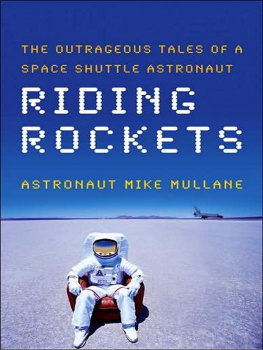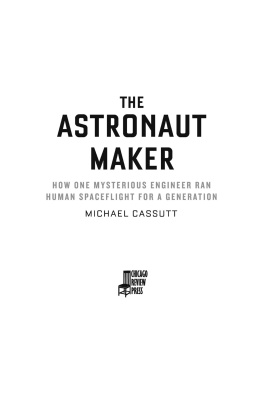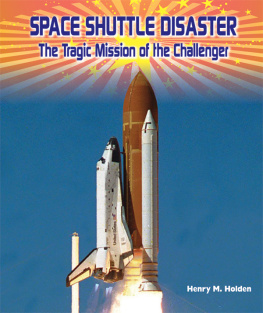The Astronauts Wife
by Robert Tine
There were times when Jillian Armacost felt as if she didnt have a lifenot a real one. It was more that she and her husband were controlled by, and were wholly owned subsidiaries of, a government agency. In this case it was the one that one Americans seemed to love and trust above all others: the National Aeronautics and Space Administration NASAthat crew-cut, square-jawed, can-do, Houston-we-have-a-problem organization. Of all the government offspring that Americans mistrusted, they mistrusted NASA the least.
And it took a lot of work to win that trust. If NASA was an old-fashioned movie studio, then the astronauts were the stars, their wives the contract players. Each of them was bound by ironclad contractscontracts that put the interest of NASA ahead of anything else. On the face of things, this was the caseat least, it was certainly the case with the astronauts themselves. They had worked hard to get to where they were, climbing the steep and slippery military ladder as fliers for the Marine Corps, the United States Navy, and the U.S. Air Force. To have achieved flight status for NASA put you at the top of the heap; it marked you as the best, not just in the armed forces of the United States of America, but as the best in the world. And this crop of fliers was said to be the best ever.
Spencer Armacost was part of this and, on the face of things, his wife Jillian imagined that he gave himself over to the spirit of NASA completely. But sometimes she caught a look in his eyes, a slight frown, a tiny gesture that suggested that sometimes he hadnt quite been able to bring himself to buy the whole NASA story. They were married, they were exceptionally close. But she could never bring herself to ask Spencer about it. It would have been too much like treason. Fred Astaire was singing about trouble coming.
All this is not to suggest that Spencer Armacost was your typical bleeding-NASA-blue flier. He knew enough to know a stupid order when he heard One, he knew that NASA was more than likely to make a mistake.and he knew it long before the Challenger disaster claimed the lives of six astronauts and the civilian Christa McAuliffe.
Fred Astaire continued, singing about moonlight and love.
Spencer was a thoughtful, well-read man with a passion for flying. He was also the only member of the next shuttle mission who knew anything at all about the career of Fred Astairea fact which set him well apart from his fellow fliers who tended to have more red-meat tastes in movies. If they ever saw movies at all, that is.
Fred Astaire was concluding: the only thing to do was dance.
Jillian and Spencer were sprawled in their big bed and you could read the history of that short evening in the archeology of the debris spread around them. On the floor, at the base of the bed was an empty bottle of pinot noir and two stemmed glasses, both drained to the dregs. Next to them were some simple white-and-blue pasta bowls, a few strands of spaghettini nestled in a pool of sauce at the bottom. Closer to the bed was a pair of mens pants, bunched and snarled as if they had been hastily kicked off; nearby, as light as a small sheet of gossamer, a pair of pearl-colored womens panties.
The languor of the couple in their bed, their limbs intertwined, told the rest of the story. Their eyes were soft and tired as they watched the movie, their faces lit by the flickering of the television set, the black-and-white movie washing their skin a pale blue. And they stared at it fixedly, as if as long as the movie ran they could keep the real world at bay for a few more moments.
Fred Astaire and Ginger Rogers danced a vigorous pas de deux on the deck of a Hollywood-class battleship as chorus boys dressed as grizzled old salts danced behind them.
Spencer shifted slightly but kept his eyes on the television set. You know, he said, this flies in the face of everything I know about the United States Navy
His wife smiled and ran her fingers through his hair. Is that so? Too bad you didnt join up.
Spencer stretched. Well, this was made in 1936 or 37before the big build up for the Second World War. I guess the Navy was just different back then.
I guess everything changed after Pearl Harbor, Jillian said, laying back on her pillow. Theres nothing like a sneak attack from a hostile foreign power to ruin a good fleet song-and-dance routine. Wouldnt you say?
Uh-huh. But it seemed that her husband had lost interest in the joke. His eyes were locked on the screen of the television set with more intensity than a light bit of fluff musical like the Astaire-Rogers musical Follow the Fleet would seem to require. It was as if he was hearing the music and the words, seeing the images for the first time and was completely enchanted by them.
Jillian, by contrast, looked less than pleased. I hate this part, she said.
Spencer looked away from the television screen long enough to shoot a quick glance at his wife. Then his eyes flicked back to the screen. The whole gesture had taken no more than a split second. This part? he said. This part is the best part He added his own voice to Fred Astaires, matching him word for word, phrase for phrase.
Jillian put out a soft hand and touched his face, turning him to face her. She looked him in the eye. No, she said softly. Thats not what I mean Its this partshe gestured weakly with her hands as if encompassing the entire room this part right now. The part right before you leave. I know youre still here but I know you are leaving, too. I hate this
Spencer leaned over and kissed his wife softly on the forehead. Ill call you.
Jillian half smiled and slapped at him weakly. Dont you dare tease me, Spencer Armacost.
It stood between them like an unbridgeable moatthe mission, Spencers next foray into space in the space shuttle Victory, the latest and most technologically advanced spacecraft in history. On one hand, on a rational level, Jillian could understand the importance of the Victory missions in the professional and even the spiritual life of her husband. To be a crew member of the space shuttle was considered the absolute epitome of a military fliers career.
Spencer Armacost had attained these lofty heights by dint of hard work and innate exceptional skill; he was the first to acknowledge, however, that his climb to the top had been facilitated by the deft diplomacy of his beautiful and thoughtful wife. Skill counted for a large part of the equation that added up to a shuttle pilot, but the right wifethe kind of wife who could charm a strategically placed general or thaw the purse strings gripped in the hands of a doubting senatordid not hurt.
The object of the game was to get Spencer a place on the shuttle crew and Jillian Armacost had worked assiduously to see that he got it. But once the goal had been achieved, she found that the slightest bud of resentment had taken root somewhere deep inside her
To the average American television viewer, watching a three-second clip of a shuttle launch usually the seventh or eighth item on the evening newsthese expensive excursions into space had gotten to be rather routine. The layman had little understanding or interest in just what went on up there, but the missions, which always seemed to have something to do with satellites, were generally judged to be Good Things For America: it was prestigious and, it was said, those satellites did everything from improving television reception to giving the United States a series of all-seeing eyes high above the earth.
But there was another side to these missions that the man or woman in the street never heard about, probably never even considered. There was a spiritual side to these immense journeys, an otherworldliness as hallowed as any Christian pilgrimage or Muslim hadj. The men who went






